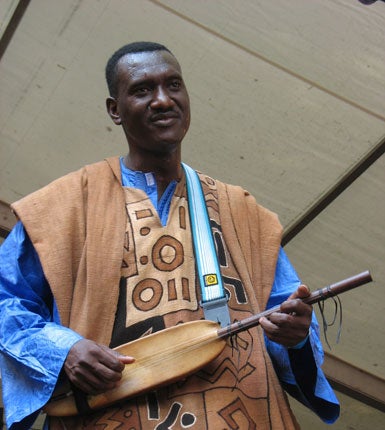Bassekou Kouyate & Ngoni Ba, Jazz Café, London

Your support helps us to tell the story
From reproductive rights to climate change to Big Tech, The Independent is on the ground when the story is developing. Whether it's investigating the financials of Elon Musk's pro-Trump PAC or producing our latest documentary, 'The A Word', which shines a light on the American women fighting for reproductive rights, we know how important it is to parse out the facts from the messaging.
At such a critical moment in US history, we need reporters on the ground. Your donation allows us to keep sending journalists to speak to both sides of the story.
The Independent is trusted by Americans across the entire political spectrum. And unlike many other quality news outlets, we choose not to lock Americans out of our reporting and analysis with paywalls. We believe quality journalism should be available to everyone, paid for by those who can afford it.
Your support makes all the difference.I Speak Fula, the new album Bassekou Kouyate is launching tonight, easily betters his groundbreaking debut, Segu Blue. The title track sees the ethnically Bamana Kouyate bringing Mali's Fula and their music into his fold. But, like his compatriots Amadou and Mariam with last year's Welcome to Mali, it acts as a general invitation to cross borders in a widening world.
That has been Kouyate's musical policy ever since he became the first to stand up and strap on his ngoni (a two-string, rustic lute) as if it was an electric guitar. The daring young man who shocked his peers that day in the mid-1980s is hard to discern in the calm, modest, bashful figure leading his band tonight. Kouyate's showmanship rests mostly in the long, clutched fingers moving minimally along his low-slung instrument. It's a black-taped, country acoustic thing still, and the band's four players irresistibly recall hillbilly banjo tear-ups deep in the Appalachians. Though Kouyate has continued his innovations by adding strings, the instrument's two-string basis gives a strict, alternating rhythmic root to the band's speeding fluency. Kouyate's high-toned solos are mostly plucked, held streams of notes, funked up with a wah-wah pedal proving again that Hendrix, as well as James Brown, made the black musical loop back through Africa. The ngoni can sing like a harp, and slur like a steel guitar.
Kouyate's wife, Amy Sacko, in a brown and gold dress more regal even than his blue and desert-brown robes, exuberantly offers beseeching vocals. Damon Albarn, a frequent collaborator from Africa Express, pulls his baseball cap down hard and is unrecognised by anyone around me, as he plays his mellotron-like film-noir harmonica in a long guest spot. He finds a context for his English psychedelia here, just as Kouyate takes American blues home through Malian back-roads. Albarn mostly sits on the stage out of sight, blowing weird keyboard warps, to the band's amusement, though when he takes the lead for some Africa Express-style spontaneity it's a gauche disaster. He's happier dancing in the crowd to the rumba of "Musow"'s tribute to women, while Sacko belly-dances and the men bounce. It's the nearest Ngoni Ba get to explosiveness. Unlike many crack African bands, this is nearer to head music: virtuosity to make you sway, drift and think.
Join our commenting forum
Join thought-provoking conversations, follow other Independent readers and see their replies
Comments